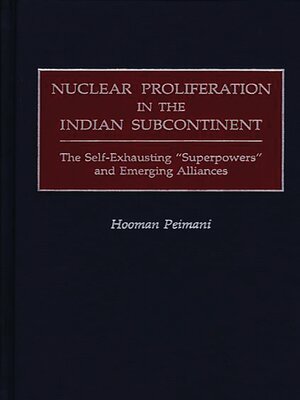Nuclear Proliferation in the Indian Subcontinent
ebook ∣ The Self-Exhausting Superpowers and Emerging Alliances · Praeger Security International
By Hooman Peimani

Sign up to save your library
With an OverDrive account, you can save your favorite libraries for at-a-glance information about availability. Find out more about OverDrive accounts.
Find this title in Libby, the library reading app by OverDrive.



Search for a digital library with this title
Title found at these libraries:
| Library Name | Distance |
|---|---|
| Loading... |
The main impact of the May 1998 nuclear tests of India and Pakistan was not on the nuclear non-proliferation regime, Peimani asserts, but on the structure of the international system. The tests could not encourage massive nuclear proliferation as many natural factors prevent such a scenario, but they surely contributed to the weakening of the mainly American-dominated international system.
The failure of nuclear India and Pakistan to achieve their objectives has increased their dissatisfaction with a system which they see as discriminating against them on the grounds of their insignificant nuclear arsenals and their severe underdevelopment. Given their limited resources, their attempts to deal with these problems in the near future and, in particular to develop credible arsenals, would be self-exhausting and not feasible. Their failure has turned them into dissatisfied regional powers who are being pushed toward forming alliances with their long-time friends, Russia and China, respectively. Each has strong reasons for dissatisfaction with the American system, which is marginalizing them. Their concerns about common enemies and threats as well as their economic and political needs are pushing these states toward the formation of tacit or official alliances. Decades of friendship and extensive ties make them natural allies and encourage the formation of an alliance between India and Russia on the one side, and China and Pakistan on the other. By creating strong regional poles, these predictably hostile alliances will contribute to the weakening of the international system and the consolidation of a rising multipolarity. Scholars, students, and researchers involved with foreign policy, American-Indian and American-Pakistani relations, and international military-political relations will find this analysis of particular interest.
The failure of nuclear India and Pakistan to achieve their objectives has increased their dissatisfaction with a system which they see as discriminating against them on the grounds of their insignificant nuclear arsenals and their severe underdevelopment. Given their limited resources, their attempts to deal with these problems in the near future and, in particular to develop credible arsenals, would be self-exhausting and not feasible. Their failure has turned them into dissatisfied regional powers who are being pushed toward forming alliances with their long-time friends, Russia and China, respectively. Each has strong reasons for dissatisfaction with the American system, which is marginalizing them. Their concerns about common enemies and threats as well as their economic and political needs are pushing these states toward the formation of tacit or official alliances. Decades of friendship and extensive ties make them natural allies and encourage the formation of an alliance between India and Russia on the one side, and China and Pakistan on the other. By creating strong regional poles, these predictably hostile alliances will contribute to the weakening of the international system and the consolidation of a rising multipolarity. Scholars, students, and researchers involved with foreign policy, American-Indian and American-Pakistani relations, and international military-political relations will find this analysis of particular interest.







